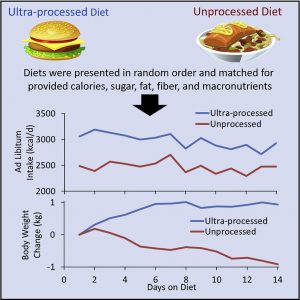Set point för kroppsvikt, del 2
Viktuppgång -vad beror det på?
Viktuppgång under livet beror i huvudsak av två faktorer: vilka gener vi föds med och i vilken vardagsmiljö vi (och därmed generna) lever. För femtio år sedan i Sverige var fetmasjukdom ovanligt, idag förekommer obesitas (definierat som BMI >30) hos var sjunde vuxen svensk, en miljon människor. Sverige har samma genpool i befolkningen då som nu -det som har ändrats är vårt samhälle och vardag, så det är här vi måste leta efter orsakerna till att vi utvecklar alltmer övervikt:
Vad är annorlunda i Sverige på 2020-talet jämfört med 1970? Idag har vi mindre fysiskt krävande jobb som samtidigt ofta är mer mentalt pressande. Man riskerar stressa mer och därmed sova sämre, med störd biologisk kortisolrytm och viktuppgång som följd. Vi försöker ”hinna med” mer varje dag i livspusslet före-under-efter jobbet. Lägg till detta att vi är online ständigt, har ett digitalt liv som ofta ”måste” skötas parallellt. Vi hinner därmed inte planera, köpa in, tillaga eller ens äta maten i lugn och ro som förr. Desto sämre planering, desto mer hel- eller halvfabrikat lagar vi till, desto fler take-aways köper vi hem, desto oftare äter vi ”i farten”.
Samma samhälle som skapar detta ”hjälper” sedan till när vi trots allt måste få i oss något -en bensinmack har idag mer skräpmat än torkarblad och såväl snabbmatskedjor som Pressbyrån/7-Eleven är i en svensk stad idag bara någon minut bort. Vi närmast uppmuntras att inte planera vad vi ska äta -bara att göra ett snabbt depåstopp med snabbmat och en caffe latte så kan du dra vidare igen! Vad har alla dessa matställen gemensamt? Jo, de serverar genomgående högprocessad, ofta livsmedelsindustriellt designad ”bliss point”-optimerad mat. Mycket socker, salt, fett och artificiella ämnen i en maximalt belönande mix.
Högprocessad mat ger viktuppgåmg
Här kan vi återvända till Kevin Halls forskningsartikel från förra bloggavsnittet. Försökspersoner som serveras högprocessad mat äter spontant mer mat, fler kalorier och snabbare än de som serveras oprocessat. Fenomenet ses från dag 1 i studien och man ökade sitt kaloriintag med i snitt 500 kcal per dag (!). Försökspersonerna hade naturligtvis inte fått 500 kcal högre kaloribehov än tidigare bara för att de gick med i en studie -utan den här maten gör ”något mer”, den dopaminbelönar hjärnan. Senast talade vi om hur kroppen styr sin vikt via ett centra i hjärnstammen, med ett slags termostat för kroppsvikt kallad set point. Normalt sett skall set point hålla kroppsvikten konstant över tid både vid tillfällig viktnedgång (som bantning) och viktuppgång. Men något i vår moderna livsstil lurar nu bevisligen med sig set point uppåt när vi går upp i vikt. Allt talar för att just högprocessad dopaminbelönande mat är en huvudorsak till detta. (Och ja, vi åt mycket mindre sådant i Sverige 1970.)

Viktuppgång efter en fetmaoperation
Det moderna obesitasoperationer (gastric bypass, gastric sleeve, SASI med flera) gör är att sänka set point i hjärnan till mer normala BMI-nivåer. Det är därför en nyopererad har minimalt med hungerkänslor och samtidigt en snabb viktnedgång. Man kan säga att kirurgin normaliserar systemet och återställer vikttermostaten till sin ursprungliga nivå. Kroppen följer sedan efter set point och 2-3 år efter operation når man sin lägsta ”nya” vikt. Ofta har då 70-80% av den ursprungliga övervikten försvunnit och man har som patient vunnit en stor mängd hälsovinster.
Majoriteten av alla opererade kommer sedan att ha sin kroppsvikt kring denna nya set point -nivå livet ut. Men inte alla. Långtidsuppföljningar visar att cirka 20-25% av opererade gått upp i vikt igen till en nivå där det blir ett förnyat problem (olika studier har olika definitioner på så kallad ”weight regain”, men siffrorna är kring denna nivå. Att gå upp alla kilona igen är däremot mycket ovanligt).
Varför kan man få viktuppgång igen efter en fetmaoperation?
Ja, vad har operationen gjort -den har normaliserat set point och återställt systemet för oss. Vi kan lita på hunger- och mättnadskänslorna igen och har en bättre kroppsförbränning.
Vad har operationen inte gjort? Den har inte ändrat våra bevisat fetmakänsliga gener. Och vilket samhälle lever de som opererats i efteråt? Jo -samma samhälle som orsakade viktuppgång, övervikt och fetmasjukdom från första början..!
Om man som fetmaopererad inte ser över hur man lever jämfört med innan operation, så riskerar man därmed att problemen börjar om. Om du som läser detta funderar på eller redan är opererad, och har en vardag fylld av stressigt livspussel med lite tid över till din sömn, matplanering eller bara lugn och ro vid matbordet -försök stanna upp en stund! Du behöver ändra de negativa delar i vardagen som du kan, ofta behöver du börja med att faktiskt prioritera dig själv lite mer. Allt kan spela in: mat, stress, sömn, träning, sjukdomar, medicinering, alkohol, skärmtid.

Vad som är negativt för just dig vet du själv bäst, det som gör skillnad för de flesta är alla aspekter av mat -så vi börjar med att fördjupa oss i vad vi äter:
Checklistan -enkla vardagsknep för fetmaopererade
1 -Huvudreglerna
- Undvik processad mat så mycket du kan! Handla inte din mat på de ”snabba” ställena.
- Handla aldrig mat hungrig!
- Försök planera -köpa – laga din egen mat så ofta du kan. Då har du koll på vad du får i dig. Naturella produkter som du själv smaksätter slår de färdigprocessade alla dagar i veckan. Prova gärna en matkasse (se nedan), laga gärna till fler dagar och frys in eller ta med till jobbet.
- Dosera dina portioner! (Här finns hjälpmedel, t.ex. Mealsizer.)
- Om du börjar känna dig mätt -sluta äta. (Även om det är mer mat kvar på tallriken. Din kropp signalerar ju att den är nöjd! Och ja, detta gäller även på bjudningen hos moster…). Överät inte.
- Du behöver äta 5-6 gånger per dag som opererad -även 10 år senare. Det är bra för ditt blodsocker och håller igång din förbränning. Det finns även här bra hjälpmedel för att få struktur på detta (Baribuddy -appen till exempel).
- Vatten är smartare än all annan dryck.
- Du är mer alkoholkänslig och alkohol är rejält kaloririkt. Varannan vatten gäller. Alltid!
- Du har sämre vitaminupptag livet ut. Vitamin är medicin för en opererad.
2 -Att navigera i livsmedelsdjungeln
- Det finns luriga produkter där det står t.ex. vegansk, glutenfri, laktosfri, ”endast frukt”, ekologisk eller liknande. Det är lockande, men i de flesta fall är produkten inte nyttigare som laktosfri eller vegansk – t.ex. om en produkt är baserad på havre men med tillsatt socker, palmolja och dadlar. Då är den naturligt laktosfri, glutenfri och vegansk – men innehåller ändå en hel del socker och energi.
- Se upp för flashiga förpackningar -företagen försöker lura/locka dig, det är ofta högprocessat.
- Smaksatta mejeriprodukter –t.ex. jordgubbsmak, brukar innehålla tillsatt socker. Undvik dem! Titta på innehållslistan efter ”inget tillsatt socker”. (Dessa produkter brukar då ha tillsatt sötningsmedel istället, vilket är okej.) Bäst är naturella produkter som man själv smaksätter med t.ex. bär. Men ibland när man är på språng, då kan färdigblandade produkter vara ”det som bjuds”.
- Ät något med fibrer vid varje matintag: t.ex. frukt, grönsaker, fullkorn, bönor/linser/nötter. Bröd/musli/flingor: Titta på fiberinnehållet! Sikta på minst 7 g fiber/100 g. Ett bra riktmärke att kolla efter är gröna nyckelhålsmärkningen. Det betyder att det inte innehåller så mycket socker, mättat fett och är fiberrikt.
- Ät något proteinrikt vid varje måltid: t.ex. kött, kyckling, fisk, skaldjur, ägg, kvarg, keso, bönor, nötter eller proteinpulver.
- Vid val av mellanmål/måltid –minst 10% protein om det är ett mellanmål. Tillsatt socker -max 10% i det du äter.
- Undvik panerat och friterat!
- Förpackningar med väldigt många ingredienser, varav många du inte känner igen? Se upp, det är nog processad mat.
- Undvik livsmedel som har socker i de tre första ingredienserna. (Ingredienser på förpackningar brukar stå i fallande ordning. Det som finns mest står oftast först.)
- Torkad frukt – svårsmält och innehåller stor mängd fruktsocker! Försök välja frukt i naturlig form i första hand så får du också i dig fibrer för mättnad.
- Fett -välj mat med mindre mättat fett (det dåliga fettet). Livsmedel med bra fetter är t.ex. nötter, avokado, olivolja, fet fisk. Dessa ska man inte heller överkonsumera då fett är energirikt. Äter du nötter t.ex. så räcker det med en handfull.
- Matkasse – det finns många att välja mellan. Oftast så kan du själv välja ”meny” och hur många dagar. Recepten som du utgår efter är beräknade på antal portioner, men för dig som opererad räcker det till fler portioner än det som står, och det är ett plus. Ta mer av det proteinrika livsmedlet när du sedan lagar maten.
3 -Checklista för din övriga vardag!
- Stress -gå igenom din typiska dag eller vecka. Vad stressar dig? Kan Du ändra på något? Extra viktigt är lugn kring matsituationer -äta sakta eller lagom mycket är svårt i stressig miljö.
- Sömn -sover du minst 8 timmar per dag? De flesta underskattar hur viktigt detta är -även avseende kroppsvikt.
- Träning? All fysisk aktivitet är bra, den bästa träningen är den som ”blir av”. Att bygga in aktivitet i vardagen (gå eller cykla till jobbet, ta alltid trapporna osv.) är smart. Mer regelrätt träning bör ha inslag av styrketräning i mixen -du behöver dina muskler och det ökar din basförbränning. Hos de flesta minskar det värkproblem dessutom.
- Sjukdomar och medicinering -kolla med din läkare om du får en ny medicin. Har den viktuppgång som möjlig biverkan? Finns i så fall annat alternativ?
- Alkohol -Sverige har en alltmer tillåtande kultur kring alkohol. Ett glas vin kan ju vara både festligt och njutbart! Tänk dock på att alkohol är 100% tomma kalorier (och mer kalorier än du anar). Viktuppgång kan bero på mer än bara mat!
- Skärmtid -all tid du lägger framför skärmen på smartphone, surfplatta, TV eller dator är tid som du kunde gjort något annat med. Hur många skärmtimmar per dag har du? Konkurrerar det ut något annat, som du vet att du borde göra?
- Best Weight -bästa vikten: Den vikt du får när du lever så sunt du kan men samtidigt ser till att du njuter av din vardag. Denna princip gäller alla och alltid, opererad eller inte opererad spelar ingen roll.

I del 3 i bloggserien kring viktuppgång och set point skall vi specifikt fördjupa oss i vad man kan göra vid viktuppgång efter tidigare fetmaoperation, så kallad weight regain. Kan man göra ytterligare kirurgi, eller behandla på annat sätt? Håll utkik!
Oavsett så gäller checklistorna ovan. A och O är att bli vän med sin nuvarande operation och få till rutiner som passar den. Om detta inte fungerar kommer ännu en operation aldrig att bli aktuell (och inte heller meningsfull). Använd gärna vår kylskåpslista!
Läs mer om mat efter operation -här hittar du externa länkar:










Senaste kommentarerna